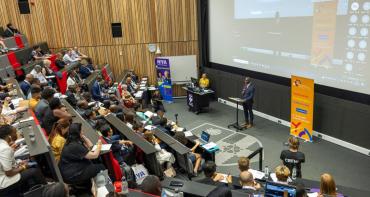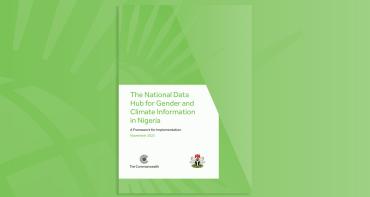By Chukwuebuka Nnabugwu and Muhammed Badamasi, Commonwealth Correspondents

This Commonwealth Secretariat blog is part of a series launched at Youth4Climate and continuing beyond COP26, featuring young people from across the Commonwealth who are leading the way on local climate action. View the full blog series.
The blogs are written by fellow youth citizens from the Commonwealth Correspondents network. To be part of this series, contact us.
Located on the Gulf of Guinea in the Atlantic Ocean, Nigeria possesses a tropical rainforest climate as well as one of the largest mangrove ecosystems in Africa. It is also the most populated African country, with around 206 million people.
The urban expansion of its growing population, however, is causing challenges to Nigeria’s environment. From the devastating effects of oil spillages in the Niger Delta region to poor waste management systems in Lagos, Nigeria’s largest city, economic growth is starting to stretch the country’s overburdened systems – including the health of its ecosystems as well as its people.
Waste problem
Each day it is estimated that Lagos alone generates about 13,000 metric tonnes of municipal waste. The Lagos state government manages this generated waste through various channels, curtailing about 7,000 metric tonnes of waste for proper disposal and recycling.
But this does not yet keep up with the amount of waste being generated by the large urban population. Evidence of the overwhelmed waste systems can be seen most clearly on rainy days, when litter is washed onto roads and public spaces.
Another contributor to the problem is a lack of general knowledge about the environmental impact of plastic waste, according to Mariam Lawani, a young environmental microbiologist in Nigeria. She says some people believe the proper way to dispose of their rubbish is to offload it on roads during rain, to be washed away.
This method, though inexpensive to citizens, is costly to the environment. Since Lagos is on the coast and surrounded by rivers, most of this improperly channelled waste finds its way into the Atlantic Ocean where it harms both marine and eventually human life.

Behaviour change
It was this visible impact of waste that led to Mariam to start a social enterprise to solve the problem, called Greenhill Recycling.
She says that every day about five to seven truckloads of garbage are taken from the ocean around Lagos. A state initiative had installed nets at critical points of entry to stem the flows into the ocean, but Mariam was struck by the fact that all the plastics being caught in the nets were recyclable.
But the idea for her enterprise was first triggered after being confronted by a large amount of litter during her way home from work one rainy day. She soon left her job at a British Council Educational School in Lagos to do something about it. Her enterprise, Greenhill Recycling, not only recycles plastics, but also focuses on changing the mindset of people, too.
Mariam says, “People had always been recycling but not formally; the educational part was not attached to it. People did not understand what they were doing […], it was mainly buying and selling for them. They were not aware of the impact of their behaviour.”
She believes that everyone must benefit in one way or other, so she created an incentive system where you earn 'green points' for waste that is disposed of through her channel. These points accumulate over time and are then used for benefits such as access to medical health care insurance, which many people cannot comfortably afford otherwise.
Social development
Starting up the social enterprise was difficult for Mariam, as she started by going from house to house to collect plastic waste. While she says it was tedious, it did help her build a subscriber base.
She also explains how once it got going, her innovative social enterprise helps improve the lives of citizens who would otherwise be putting their lives at risk by working on dump sites. “Though the people who work there get other valuables, such as metals and all, their lives and health are more at risk. And most times they are paid very little for these.
“We had to design a model that would capture all these materials before they get to the dump or Ocean at all, and that was how we came about the incentive model that we operate, where we give green points.”
Growing hope
Today many people in Lagos recycle with Greenhill Recycling, not only because of the benefits but also because they want to help support this positive behaviour change. As well as organising rallies for World Environment Day each year, the enterprise also visits schools to educate children about proper disposal. It is this larger vision that is likely to help Mariam achieve her dreams of expanding the business to other Nigerian states.
Another young woman with a big vision for solving the issue of plastic waste in Nigeria is Sohfiyyah Murtadho, a marine biology student at the University of Lagos. She aims to get rid of plastic waste along the shoreline of Badore, a town located in Ajah, Lagos which is home to a thriving lagoon.
In 2019, Sohfiyyah started the Badore shoreline project as part of her work with the United Nations Millennium Fellowship. With a small team, she set out to clean up the area. But through her role she learned that to be effective, it is critical to create awareness about a project’s aims. In her case, this was through sensitising the local neighbourhood about the harms of poor waste management.
She explains that clean-up attempts will not be effective if local people continue to dispose of their waste improperly. “The major impact we made was on the residents, because I always say that any problem comes from the people because these plastics didn’t just get there.”

Sohfiyyah also plans to equip houses in Badore with proper waste disposal tools and partner with recycling companies to introduce initiatives such as a “plastic for pad initiative”, that will incentivize people to collect plastic wastes for recycling. She also intends to continue raising awareness about caring for the environment in schools.
“When you have students in your corner […], they educate their friends, they educate their parents. So, there is a great impact when kids are in the mix. We are working on having an event with the school, talking to the kids, and educating them, getting them to talk to their parents as well”.
Currently the Badore shoreline project is on hold because of Covid-19, which has led to an increase in the cost of materials and difficulty in securing funds. But Sohfiyyah intends to partner with NGOs and other corporate bodies to explore other means of raising funds.
Building networks
Many young people in Nigeria like Sohfiyyah are actively contributing towards achieving UN Sustainable Development Goal (SDG) 14, sustainability for life underwater, by building networks, contributing to academic resources and providing solutions. But acting doesn’t have to be complicated.
In 2018, Mayokun Iyaomolere, a post-graduate student at Obafemi Awolowo University, founded Plogging Nigeria. The club – which simply combines jogging with litter picking – has grown to over 1,500 members on 21 campuses, with two community clubs in Lagos State.
With the help of other young people, Mayokun has built a strong network of people committed to beating plastic pollution in Nigeria. He believes the important thing is to start where you are, with small actions.
In his case, Plogging Nigeria started from being tagged on a Facebook post of people plogging in Sweden. At that time, plogging was a fairly unique idea. Coincidentally, the theme for World Environment Day 2018 was Beat Plastic Pollution, so with that in mind, Mayokun decided to start the club. Within three years, the club has covered over 350 kilometres and recovered over 100,000 plastic bottles.

Mayokun says that although most Plogging Nigeria activities are not linked directly to SDG 14, he understands the connection between the goal and what he does. “We don’t deal directly with the ocean per se, although we have had clean-ups around beaches in Nigeria in Lagos and Ondo state – but we know that what we are doing is that we are rescuing plastics from land and we are preventing it from getting to the sea.”
He has also discovered that picking up plastic waste will not solve the problem alone and that if the goal is to be reached by 2030 or earlier, they must adopt other proactive measures. The club now has several programs including an online training programme about practical waste-handling and eco-consciousness called Green Switch Academy.
The online learning platform also engages in training people on up-cycling, and partners with recycling firms to convert waste into other products. The Academy, which boats over 786 graduates from 15 African countries and five European countries, is creating young climate leaders who will continue the important work of preventing plastic waste pollution in their respective environments.
In the future, Mayokun hopes to start a Plogging Nigeria recycling enterprise and an up-cycling academy – but he realises there are challenges to overcome first, including maintaining volunteer engagement.
To tackle this, he introduces fun activities like dancing and running, as well as meals and snacks during plogging. However, some challenges like funding are not as easy to overcome. Once plogging became more regular and expansion began they received voluntary donations, grants, awards, and small-scale recycling. But since then, Covid-19 has tripled the price of materials like face masks, hand gloves and disposable bags.

Solutions for all
However, the future looks promising for Nigeria Plogging, which has received many awards and grants like the Global recycling Hero, GoForItAfrica sustainable impact awards and the Recyclan ArtwithPETChallenge, as well as recognition from several platforms like BUZZFEED news and the Commonwealth Youth Council and most recently the World Economic Forum and BBC.
Mayokun considers the highest impact of the club though, to be the ability to cause people to change for the planet – and many of his fellow ‘ploggas’ agree.
Erioluwa David, a principal plogga in the University of Lagos arm of the club says: “Since joining Plogging Nigeria, my behavioural and intellectual patterns have seen a major turnaround on all facets. I have grown more conscious of my environment and my actions with a sense of responsibility towards promoting sustainability.
“Being a member of this club has granted me the avenue to build leadership, interpersonal and digital soft skills, which are of immense value. Plogging Nigeria has helped me grow tremendously. I am glad and privileged to be part of the world's solutions."
All around the world, young climate leaders like Mariam, Sohfiyyah and Mayokun in Nigeria are taking the initiative to start small in solving otherwise unimaginably big problems.
With initiatives such as the Badore shoreline clean-up, Greenhill Recycling and Plogging Nigeria, they are proving that young people can be the local solution that the whole world needs – real change-makers, who are finding simple ways to create a safer future for us all.
This Commonwealth Secretariat blog is part of a series launched at Youth4Climate and continuing beyond COP26, featuring young people from across the Commonwealth who are leading the way on local climate action. View the full blog series.
The blogs are written by fellow youth citizens from the Commonwealth Correspondents network. To be part of this series, contact us.
Share this blog series on social media using hashtags #CommonwealthForClimate, #CommonwealthYouth and #BlueCharter.
Nigeria Plogging photographs are by Juwonlo Oloyede and owned by Plogging Nigeria Club
Media contact
- Josephine Latu-Sanft Senior Communications Officer, Communications Division, Commonwealth Secretariat
- T. +44 20 7747 6476 | E-mail



